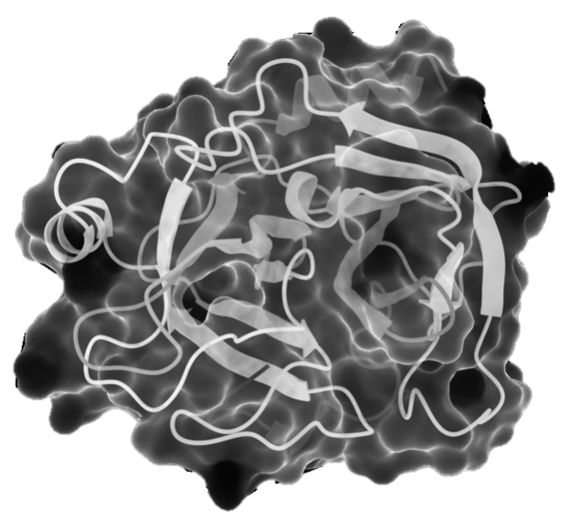Question 1
Human insulin is a peptide hormone consisting of 51 amino acids.
Which of the following would represent the minimum number of bases that the gene coding for insulin would consist of?
26
51
102
153
Human insulin is a peptide hormone consisting of 51 amino acids.
Which of the following would represent the minimum number of bases that the gene coding for insulin would consist of?
26
51
102
153
Trypsin is a digestive enzyme found in pancreatic juices that breaks down proteins into polypeptides in the small intestine. The image below represents the three dimensional structure of trypsin.

Image courtesy of 0fb1d8. Licensed under Creative Commons Attribution-Share Alike 4.0 International license. Reused and distributed under conditions found at: https://creativecommons.org/licenses/by-sa/4.0/deed.en
Which of the following would be the most accurate description of the conformation of trypsin?
It is a functional protein that is folded into a specific shape which is held in position by bonds between the R-groups of neighbouring amino acids, with hydrophilic R-groups facing towards the outside of the molecule
It is a functional protein that is folded into a specific shape which is held in position by bonds between the R-groups of neighbouring amino acids, with hydrophobic R-groups facing towards the outside of the molecule
It is a structural protein that is folded into a specific shape which is held in position by bonds between the R-groups of repeating amino acids
It is a functional protein that is folded into a specific shape which is held in position by bonds between the R-groups of neighbouring amino acids, with hydrophilic R-groups facing towards the inside of the molecule
Rituximab is an example of a therapeutic protein that is used to treat certain types of cancers and autoimmune diseases. It is very sensitive to temperature and pH changes and is typically injected into the bloodstream of patients.
Which of the following statements would explain why therapeutic proteins, such as rituximab, cannot be taken orally?
I. The molecule would vibrate so fast once in the stomach that the intermolecular bonds would break
II. The conformation of the protein will change once in the stomach and it may become non-functional
III. The protein may become insoluble once in the stomach and form a precipitate due to the breakage of ionic bonds
IV. Conditions in the stomach will cause the hydrophobic R-groups of the protein to be exposed to the outside of the molecule
I and IV
I, II and III
II and III
II, III and IV
The denaturation of three different proteins (P, Q and R) at different temperatures were investigated. The more denatured a protein is, the less stable the molecule becomes. The following graph shows the results of this investigation.
Which of the following would be the most valid conclusion that the scientists can draw from these results?
Protein R would be less stable and had a lower rate of denaturation above 70°C compared to protein Q, while protein P was fully denatured by 80°C
Protein R would be more stable and had a lower rate of denaturation above 70°C compared to protein Q, while protein P was the least heat tolerant of all the proteins
Protein Q would be more stable and had a lower rate of denaturation below 70°C compared to protein R, while protein P was fully denatured by 80°C
Protein Q would be less stable and had a higher rate of denaturation below 70°C compared to protein R, while protein P was the least heat tolerant of all the proteins
Which of the following statements applies to both the proteome and genome of an organism?
I. Every cell in an organism is reliant on this for its survival
II. It is a reflection of the actual events taking place inside the cells of an organism
III. There are slight variations present between individual organisms
IV. It can be variable over time depending on the activities of the cell
I and II
I and III
I, II and IV
II, III and IV